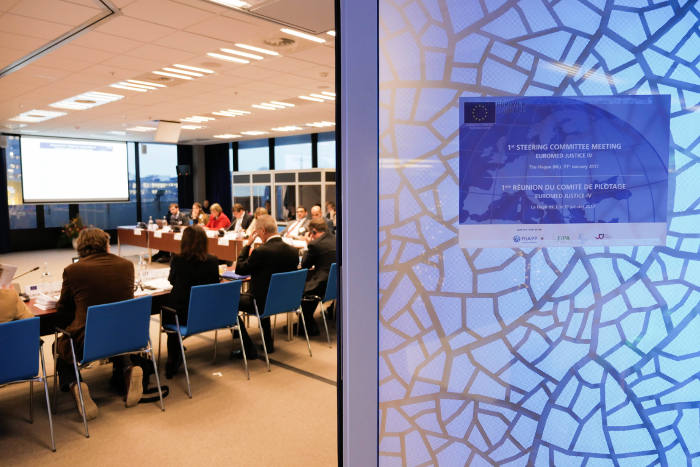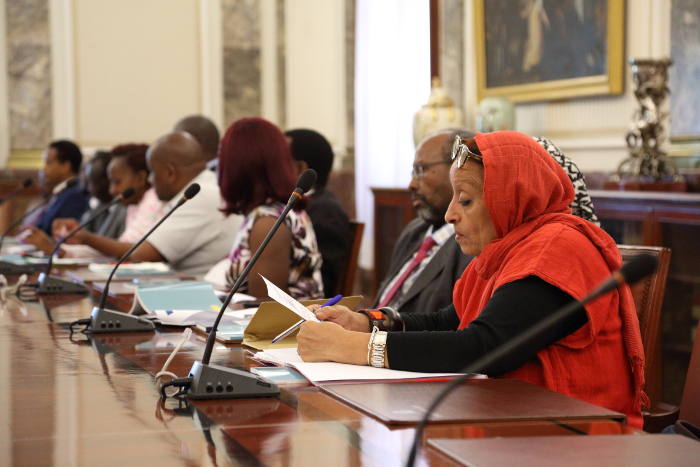-
|
28 June 2018
|Posteado en : Reportage
The revolutions in North Africa and in the Middle East initiated democratic reforms, but also left space for threats such as terrorism. In both cases, cooperation has played and continues to play a determining role
In 2011, people took to the streets of the Middle East and North Africa. The Arab world called for democracy and rights in their countries through popular protests that were included in the concept of Arab Spring. Seven years later, the changes are not entirely noteworthy. Armed conflicts and terrorism have curtailed many of those expectations. However, political, economic and social reforms were initiated, which in some cases continue to develop at a slower pace.
These are processes in which cooperation has played and can play a determining role, contributing experiences from other countries that have gone through similar situations or confronting threats that slow down development. In this context of transition, several projects in the region are managed by FIIAPP with European Union funding. Those that have to do with justice and security particularly stand out.
Tunisia was the first country where revolution was mentioned. Since then, “there has been a first democratic election, a constituent government and an approval of the Constitution in 2014”. This was explained by Ángel Llorente, coordinator of the project to accompany judicial reform in the country that ends this year. The objective has been to carry out “an organisational reform as a consequence of the process of democratic transition” in the Ministry of Justice. And to create from there an independent judiciary that had never existed in Tunisia.
Despite some resistance that could have meant a step backwards, Llorente believes that civil society will not let that happen: “They are very aware of their rights, I think it is very difficult that they could now give up something that has cost them a lot to achieve”. An enthusiasm that reminds him of Spain a few years ago.
EuroMed Justice IV is also committed to improving judicial systems. In this case, in the southern region of the Mediterranean. Algeria, Egypt, Israel, Jordan, Lebanon, Libya, Morocco, and Syria are working together with the Spanish and French Ministries of Justice to create an efficient, democratic system that respects human rights and is consistent with international regulations .

Meeting of EuroMed Justice IV in The Hague In its fourth phase, the project is also part of the EU’s neighbourhood strategy. Most of these countries are included in the European Neighbourhood Policy, which was revised precisely in the context of the Arab world revolutions to provide better support in their democratic transitions. After all, its main objective is to strengthen relations with neighbouring countries in the community space, based on common values – democracy, human rights and the rule of law – and to promote greater economic integration, mobility and stability.
Relationships that, in the case of EuroMed Justice IV seek a necessary international judicial cooperation, according to Victoria Palau, coordinator of the project. “There are problems, such as terrorism, cybercrime and human trafficking, that, if not resolved at the regional level, are impossible to address,” she says. In this context, the project witnessed the first declaration of collaboration between European public prosecutors and the Mediterranean countries, to work together to address these problems.
Judicial cooperation is also one of the components of the project for the application of the Rule of Law in the Horn of Africa and Yemen, the objective of which is to fight against security threats. In particular, it works to improve the capabilities of the intelligence services, the security forces, and the prosecutors and courts.
Eritrea, Ethiopia, Kenya, Somalia, Sudan, South Sudan, Uganda, Yemen and Djibouti are the countries that benefit from this project funded through the Instrument for Stability and Peace (IcSP). What happens in these countries, even if they are not included in the neighbouring region of the EU, does affect the continent.
In addition, it is an example of how terrorist groups take advantage of moments of political instability to act. “When there is a power vacuum, these groups always try to sneak in with more or less success,” says Javier Vega, project coordinator. In the end, terrorism is an increasingly global threat with an important focus in this geographical área.

Visit of judicial authorities from the Horn of Africa to the State Attorney General’s Office The key is to act regionally so that it does not spread to the rest of the world. For example, by controlling the territory as is also done in the Sahel region – through the Rapid Action Groups – and in Niger, more focused on illegal immigration.
The European Security Agenda underlines the need to take measures to deal with this threat in a more effective and comprehensive way, including the international community and cooperation projects. One of the latter, also managed by FIIAPP, focuses specifically on the fight against terrorism in the MENA region (Middle East and North Africa).
Work that, according to Mariano Guillén, director of the Justice and Security Area with FIIAPP, also seeks to “strengthen the political dialogue within the Arab League”, to favour cooperation among the countries of the region. Morocco, Algeria, Tunisia, Libya, Egypt, Jordan, Lebanon, Iraq, Syria and Palestine are the countries that, despite their political, economic and social differences, work to find common responses to terrorism. “The terrorist threat does not distinguish the levels of development in the countries and it can only be attacked through cooperation,” says Mariano Guillén.
The instability of the changes leaves room for security threats that do not recognise borders. But the same changes are necessary if we see them as an opportunity to improve, as a good time to draw on similar experiences while working together on those problems that affect us all.






